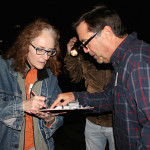From my columns, you may not know that in my professional life I’m a local elections analyst. Lately, I’ve taken a notice that just a few hours away from North County may be a major GOP standoff.
Depending on which political pundit you ask, Nevada’s presidential caucuses are either inconsequential or a speed bump between South Carolina’s Feb. 20 primary and Super Tuesday March 1. Most candidates don’t spend much time or money there.
The caucuses aren’t scrutinized by the media and pollsters in the way other early primary states are, and they lack the storied tradition of an electoral bellwether. However, as the “first in the West” primary in a swing state, the Nevada caucuses are worthy of more attention.
What I find most fascinating about the state is that we know so little about republican caucus-goers there, but what we do know about them is different than republicans in other early voting states.
We are limited in drawing conclusions, as we have only a small sample (2008, 2012) of state party caucuses to analyze. In those contests, the voter turnout rate was abysmally low (11.1 percent in 2008 and 8.2 percent in 2012) compared to other early states (20 to 21 percent in Iowa and 39 percent in New Hampshire). Despite the size of Nevada, the state GOP electorate that showed up to the caucuses in 2012 was tiny — about 33,000 caucus-goers, compared to 122,200 in Iowa, and 248,000 casting ballots in the New Hampshire open GOP primary.
Curiously, CNN’s 2012 exit polls found that unlike Iowa, New Hampshire or South Carolina, most (54 percent) Nevada caucus-goers live in urban communities (Las Vegas and Reno). They’re also geographically clustered; according to the latest figures from the Nevada Secretary of State, 60 percent of active registered Nevada Republican voters live in Las Vegas’s Clark County. In 2012, a little more than half (51.5 percent) of all state GOP caucus-goers cast their ballots from Clark County.
Dismissive pundits will say that Nevada GOP caucus-goers will simply be “falling dominoes,” sharing the same attitudes and choices of other early primary voters. However, it’s not a stretch to imagine that in the next few weeks, some key factors will emerge to impact the race, making Nevada more pivotal:
Narratives will change. If businessman Donald Trump wins Iowa and New Hampshire, the media narrative will likely turn from “is this really happening?” to “who can stop Trump?” Campaign reporters and pundits will begin to draw contrasts between Trump and perhaps one or two other candidates max (likely Cruz and Rubio). The perceived “choice,” for better or worse, will be whittled down. This is likely to draw more undecided voters off the fence, as well as donors looking to back a viable champion.
GOP presidential contenders drop out. After three rounds of losses, we can expect at least one or two candidates to drop out of the race. There will be intense pressure from supporters and donors to do so. It’s unclear who is likely to pick up the votes of which candidates, or who will receive the endorsements of the drop-outs; however, it is likely that at least one candidate will emerge to match Trump’s electoral support in time for the Nevada caucus.
Whether or not you’re a republican, you have a good chance to see the presidential candidates making the headlines up close (and for free!) later this month. Las Vegas is a good bet for major campaign rallies, and it’s only about 4-½ hours drive from North County. Otherwise, you may have to wait for an invitation to a $5,000 a plate fundraising dinner to see them.
Vince Vasquez is a think tank analyst based in Torrey Pines. He is a Carlsbad resident.


